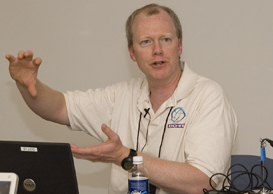Putting It All Together
When facilities are accessible, assistive technology is provided, and electronic resources are universally designed, all students can participate in technology-based instruction. A computer camp provides a good example of how all of this can come together. View the video Camp: Beyond Summer and read the publication Beyond Summer: Conducting Internet Activities at Camp.
It is clear that positive outcomes can be experienced by students with disabilities who have access to facilities, computers, and electronic resources. A typical camp for children and youth might want to add Internet activities to its program offerings for many reasons.
- Learning to use the Internet is fun and fits in with the exploratory nature of camps.
- Internet work can support interaction for socializing, support, and program participation year-round for those campers who gain Internet access in their homes or schools.
- Internet activities can support academic growth as campers use technology, practice reading and writing, and access information.
In short, with growing concern over the low academic achievements of American youth, summer camping programs can be part of the solution while providing new, exciting experiences for their campers. However, efforts should be made by any camp program to ensure that computing facilities are accessible, students with disabilities have access to the assistive technology they need, and that the electronic resources used are designed to be accessible to all participants. Only then can technology truly level the playing field for all participants.

Tip: Instruction in Technology Access
In delivering technology instruction to preservice and inservice teachers, be sure to emphasize the three important access issues for school and other programs, such as summer camps, to address—access to the facility, access to the computer, and access to the electronic resources. Universal design applied in all three areas leads to an accessible technology program. In the Presentations section of this notebook, you will find guidelines and materials for delivering this content.